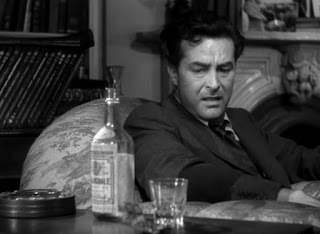Talk about perfection.
Have you ever finally
gotten around to watching a movie and, after it’s over, realized what an idiot
you were for not watching it sooner?
That’s how I feel after watching The
Lost Weekend. I haven’t seen a movie
this wonderful since Portrait of Jennie
way back in July.
For those of you who
have never heard of this movie or who might have but are clueless as to what it’s
about, The Lost Weekend showcases an
alcoholic’s troubles over the weekend.
Of course, that ten word description hardly does the picture
justice. Directed by the wonderful Billy
Wilder and starring Ray Milland in the title role, this is not a picture you
want to think twice about watching.
Milland, who earned an
Oscar for his performance, plays a man by the name of Don Birnam. Birnam just so happens to be a writer, as
well as an alcoholic. Throughout the
movie Don struggles with his alcoholism and his failures in life. Being a “writer” (if that’s what I can call
it) myself, it’s interesting to see how he struggles with the fact that he can
never write more than is hardly anything.
Experiencing through his storytelling how his writer’s block and harsh
self-criticism drive him to excessively drink really gets to you. How can a man who has so much potential—he points
this out himself when he says he was declared a genius at age nineteen and has had
his writings compared to that of Hemingway—let himself slip away so much?
Never having ever been
around someone drunk, I’ve never experienced the side effects of too much
alcohol. But the way the movie is
written out and shot gives quite the insight.
There’s not just the silly walking around and slurred remarks. You see the horrible things the alcohol
drives Don to do—how it makes him crazy with cravings for just one more
glass. How he’ll pawn anything, swipe
anything, do anything just to get a little more cash to pay for the next round
of drinks. The Lost Weekend is about a drunken man, but it’s not a movie that
uses drinking to create comedic relief.
In fact, after watching
this movie it’s okay to feel slightly offended when movies do do that because it’s not something to laugh at. Too much drinking can be a serious problem. I know you’ve all probably heard that at
least once in your lifetime from someone—whether that be a parent, police
officer, whatever. But it almost becomes
real when you see the hallucinations Don’s intoxicated brain conjures up and
you see him pushing away everyone else all because of a bottle of rye.
It seems so many times
Don tries to quit but fails. He keeps
resorting back to alcohol.
“Well, the first
thing I wrote, that didn't quite come off. And the second I dropped — the
public wasn't ready for that. I started a third and a fourth. Only by then,
somebody began to look over my shoulder and whisper in a thin, clear voice like
the E string on a violin. "Don Birnam," he whispered, "It's not
good enough, not that way. How about a couple of drinks just to set it on its
feet, huh?”
It drives at him, nags
at him, drives him insane. At one point
he says he’s tried to end it all once with a gun and a couple of bullets. Yet that voice in his head “always wants us
to have a drink first.” And so starts
the next round of drink after drink, drunken night after drunken night. He has a problem, he knows the problem, yet
he’s near helpless when it comes to resolving it.
By the end of the film,
your brain should be fried, as well as your emotions. This movie just takes on a ride and never
ceases to amaze you. From the acting to
the dialogue to the directing and cinematography, this movie is terrific in
every aspect. It deserves every award it
received, as well as any it might one day in the future.
Review Out!
~Bailey
Want a full review?
Want a link to the
full movie?

